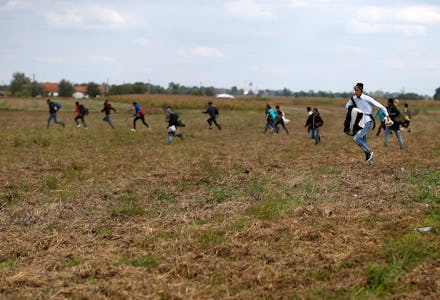Watch the Dramatic Moment Hundreds of Refugees Broke Out of Camps in Hungary

A dramatic scene unfolded near the Hungarian-Serbian border Tuesday in the Hungarian town of Roszke as hundreds of Middle Eastern and Asian refugees broke out of a police holding facility, running through fields in an attempt to break out of custody.
CNN reports police did not stop the breakout, which came after refugees arriving in Hungary mainly from the war-torn countries of Syria, Iraq and Afghanistan have found themselves locked up behind fences, treated poorly by the country's right-wing government and yearning for better lives in more prosperous European countries.
CNN's Arwa Damon was present on the scene as the refugees decided to strike out on their own. Some merely walked off, while others fled more quickly, fearful of the police response.
Photographers caught other shots of the refugees' escaping:
The increase in migrants comes as Hungary has acknowledged it does not have the ability or will to deal with refugees crossing into its lands on their way to western Europe and began putting them on trains and buses to Austria and Germany.
According to the Wall Street Journal, Hungarian legislators have recently passed tough-on-migration policies, including declaring a state of emergency and enabling "authorities to punish migrants who damage the recently completed razor-wire fence on its border with non-EU member neighbor Serbia with several years in prison." Another law allows government officials to detain migrants heading northwest from Serbia in camps and send them back.
While both Austria and Germany welcomed thousands of refugees over the weekend, they have also requested the pace of migrants slow. Munich has received over 17,500 people since Saturday. German Vice Chancellor Sigmar Gabriel told the BBC he expects Germany to absorb as many as 500,000 refugees annually, and 800,000 in 2015 alone.